5 Best Chatbot Tools for Ecommerce (Deep Dive with Pricing & Features)
In today’s ecommerce landscape, customers expect fast, personalized, and always-available support. At the same time, store owners need tools that don’t just answer questions but also help drive sales, recover abandoned carts, and nurture customer relationships across multiple channels. That’s where chatbots come in. More than just virtual assistants, modern chatbot platforms double as marketing engines—automating conversations on websites, social media, and messaging apps to keep shoppers engaged from the first click to the final purchase.
In today’s ecommerce landscape, customers expect fast, personalized, and always-available support. At the same time, store owners need tools that don’t just answer questions but also help drive sales, recover abandoned carts, and nurture customer relationships across multiple channels. That’s where chatbots and intelligent solutions like AI Voice Agents come in. More than just virtual assistants, modern chatbot platforms double as marketing engines—automating conversations on websites, social media, and messaging apps to keep shoppers engaged from the first click to the final purchase.
But with so many options available, choosing the right chatbot builder can feel overwhelming, especially for beginners. Some tools shine at social media automation, while others excel at AI-powered support or multichannel integration. The best choice depends on your goals, your audience, and the platforms where your customers spend their time.
In this article, we’ll walk through five of the best chatbot builders for ecommerce—SendPulse, ManyChat, Chatfuel, Chatbase, and Botsonic. Each one has its strengths, from abandoned cart recovery and product catalog support to AI knowledge bots and Instagram automation. By the end, you’ll know exactly which tool is right for your store and why SendPulse stands out as the most well-rounded, beginner-friendly option for brands that want to grow without switching multiple platforms.
1. SendPulse – Best All-Rounder for Multichannel & Ecommerce Automation
If you’re starting an online store and want a chatbot platform that grows with you, SendPulse is a fantastic choice. It offers a generous free plan that includes up to 10,000 messages per month, three chatbots, and 500 subscribers, which is more than enough to test and validate automation ideas. The cheapest paid plan starts at about $8 per month (billed annually), unlocking unlimited messages and chatbots, higher subscriber counts, removal of branding, and more advanced features.
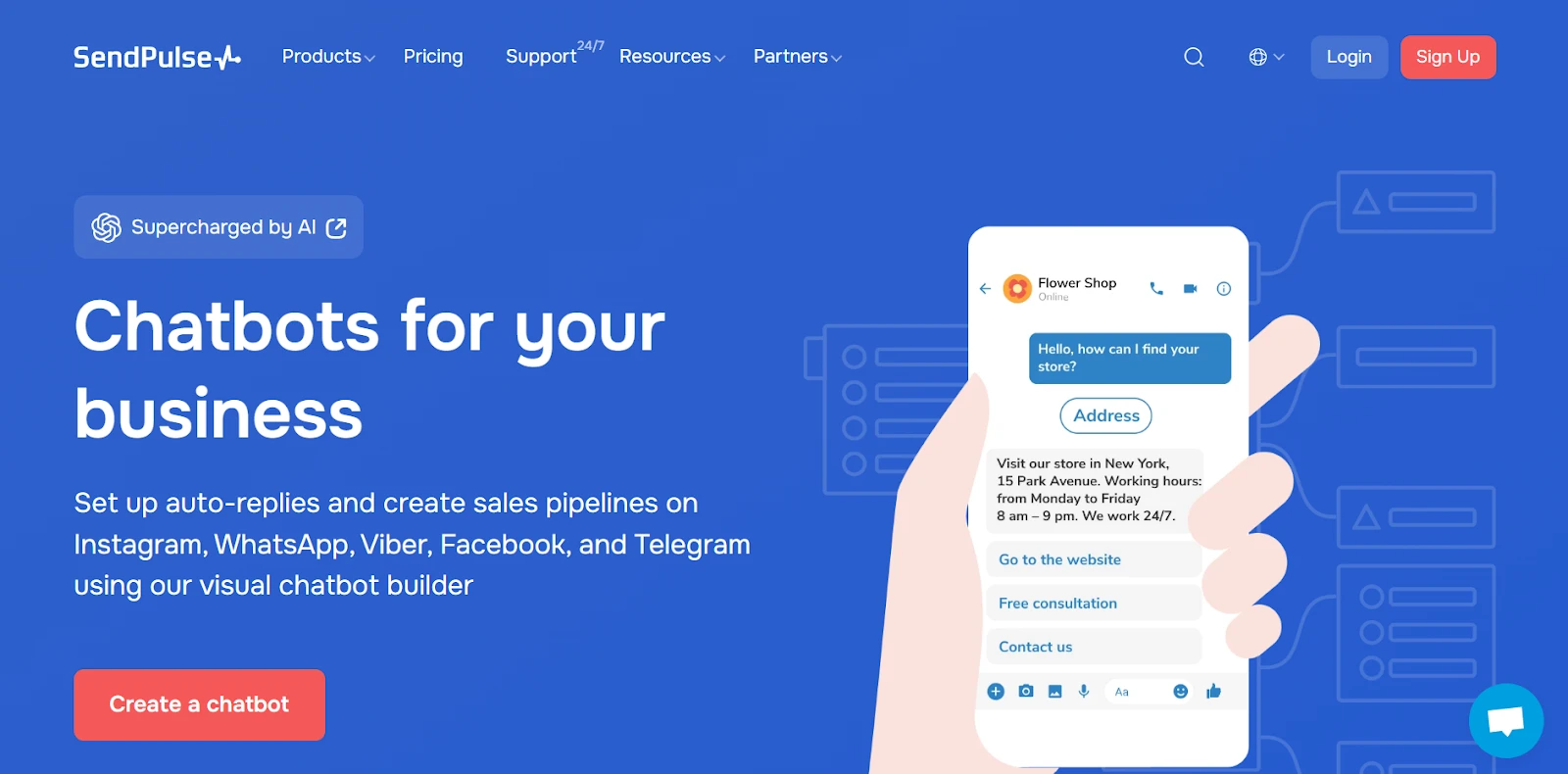
SendPulse stands out because it supports multiple channels in one place. You can embed a chatbot on your website, set up Instagram DM and comment auto-replies, run campaigns on WhatsApp as an official Business Solution Provider, and fully automate Facebook Messenger conversations. Beyond that, it also includes SMS and email, making it a true all-in-one marketing automation platform. The platform supports rich UI elements such as quick replies, carousels, and product cards, along with referral URLs and QR codes that drive people into specific flows from ads or physical touchpoints.
For ecommerce, SendPulse delivers the essentials: abandoned cart recovery, product catalog integration, and review request flows. It supports event-based triggers such as cart abandonment, purchases, and site visits, so your automations are highly relevant. The drag-and-drop flow builder is intuitive yet powerful, supporting conditions, variables, loops, and even API integrations. On top of this, you get segmentation, personalization, and GDPR compliance tools, plus a unified inbox that blends human and bot conversations. This makes SendPulse an ideal starting point for beginners who want ecommerce-specific tools without cobbling together multiple platforms.
2. ManyChat – Best for Social & Messenger-Centric Stores
ManyChat is widely regarded as the go-to chatbot builder for businesses that live on social media. Its free plan allows you to manage up to 1,000 contacts and experiment with Messenger and Instagram flows. To unlock the full power, you’ll need the Pro Plan, which starts at $15 per month for 1,000 contacts. This adds advanced broadcasting, SMS integrations, WhatsApp support, and richer flow customization. The platform also offers a 14-day free trial of Pro features, letting you access advanced targeting and analytics.
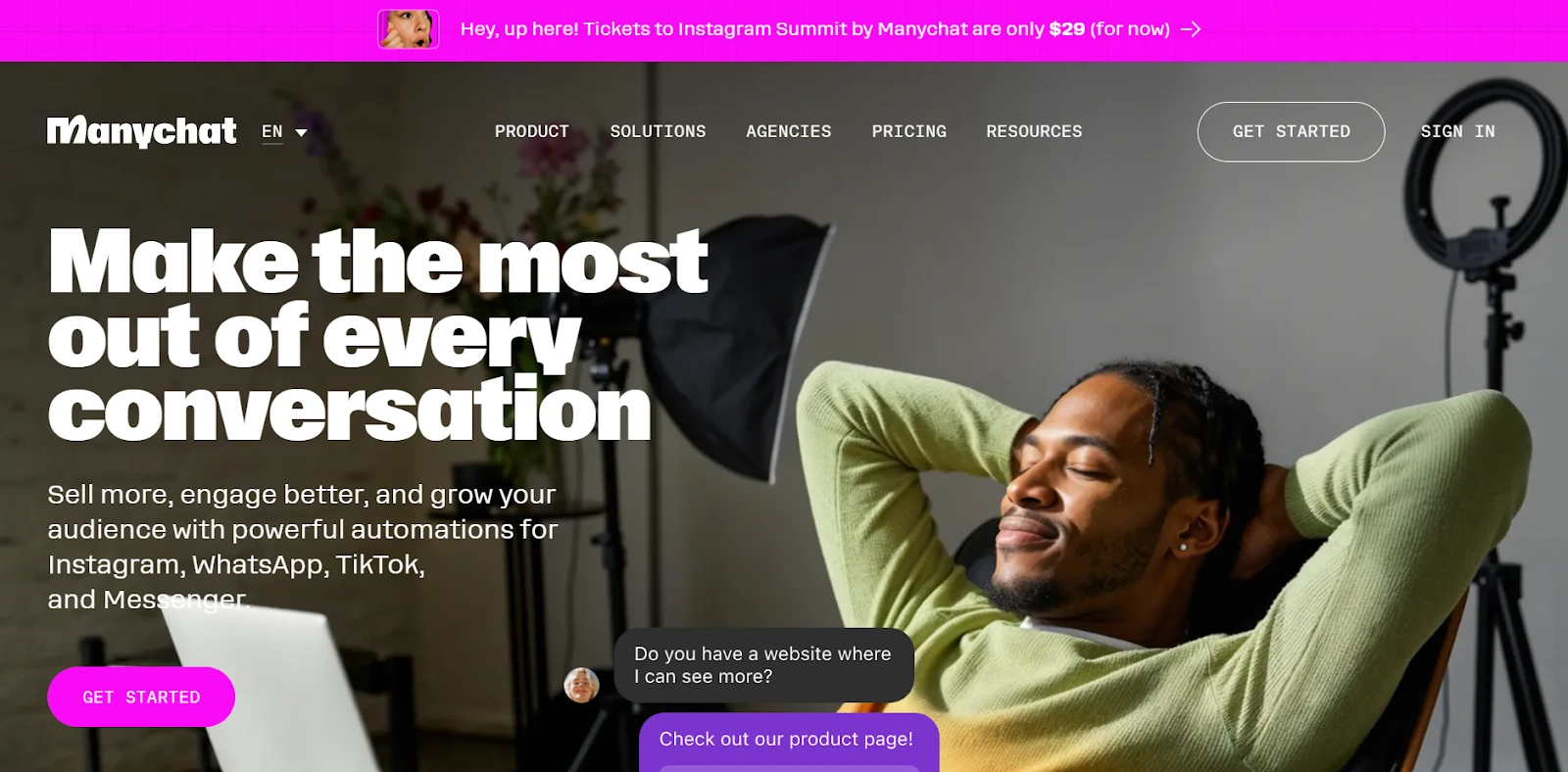
Where ManyChat shines is its deep integration with Facebook, Instagram, and WhatsApp. If your audience is active on these platforms, ManyChat can automatically respond to Instagram comments, story mentions, and direct messages. It also integrates tightly with Facebook Messenger, enabling broadcasts, coupon distribution, and interactive flows. Ecommerce-focused features like abandoned cart recovery, product catalog cards, and review request flows are available, making it a strong contender for stores that sell heavily through social channels.
The flow builder is beginner-friendly, with drag-and-drop functionality, branching, and reusable templates. Segmentation is also powerful, with the ability to use tags, custom fields, and behavioral triggers. ManyChat supports broadcasting across channels while remaining compliant with platform rules. The trade-off is that its pricing scales with your contact list, so costs rise quickly as you grow. Still, if most of your customers come from Instagram or Messenger, ManyChat can help you turn social engagement into sales.
3. Chatfuel – Best for Meta-Platform Ads and Automation
Chatfuel is another strong option for businesses focusing on the Meta ecosystem. Its free plan offers limited conversations and contacts, while paid Pro plans start around $24/month for Facebook/Instagram bots (up to ~1,000 conversations) and ~$39/month for WhatsApp.
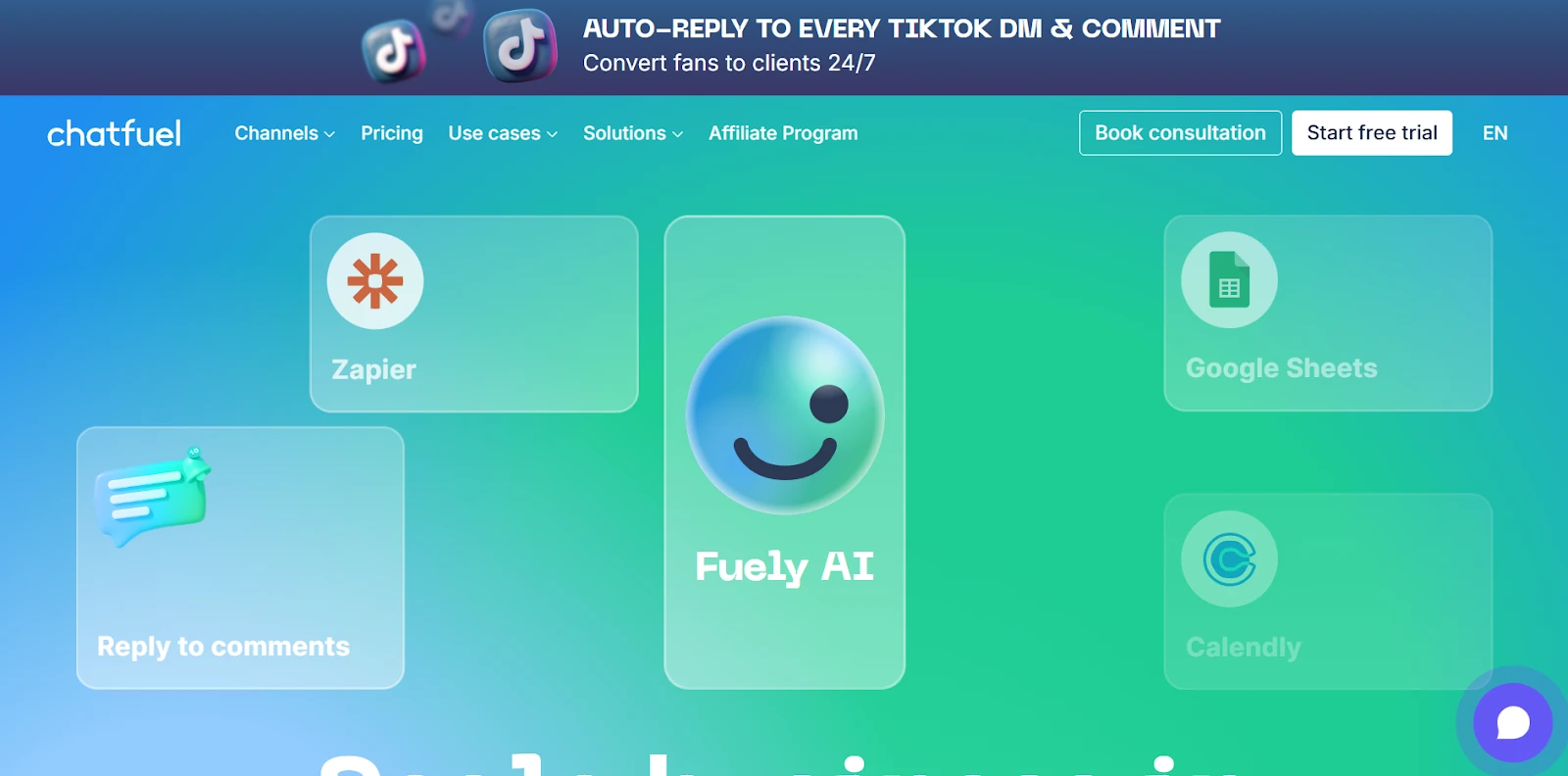
Like ManyChat, Chatfuel is built with Facebook and Instagram automation in mind. It excels at running campaigns connected to Meta ads, automatically replying to post comments, and engaging users through Messenger conversations. It supports Instagram DM automation, comment replies, and story interactions, making it easy to connect ad campaigns with follow-up chatbot flows. WhatsApp support is available at higher tiers, while website widgets and SMS are less central compared to SendPulse.
Ecommerce stores benefit from features like abandoned cart recovery, product catalog integration, and event-based triggers tied to user actions. The visual flow builder is highly rated, with drag-and-drop functionality, conditionals, and reusable blocks. Chatfuel also provides rich UI options such as quick replies, buttons, and galleries, which work well for showcasing products. Its weakness lies in limited support for non-Meta channels and higher costs as you expand. But if your growth strategy depends heavily on Facebook ads and Instagram engagement, Chatfuel is a natural fit.
4. Chatbase – Best for AI-Powered Customer Support
Chatbase takes a different approach by focusing less on marketing automation and more on AI-driven support bots. It allows you to upload content like FAQs, product manuals, or help articles, and then automatically trains a chatbot to answer customer questions. This makes it ideal for ecommerce brands with large product catalogs or frequent support requests. The platform offers a free plan covering 100 message credits/month. The cheapest paid plan will cost you $32 for 2,000 message credits and access to advanced models.
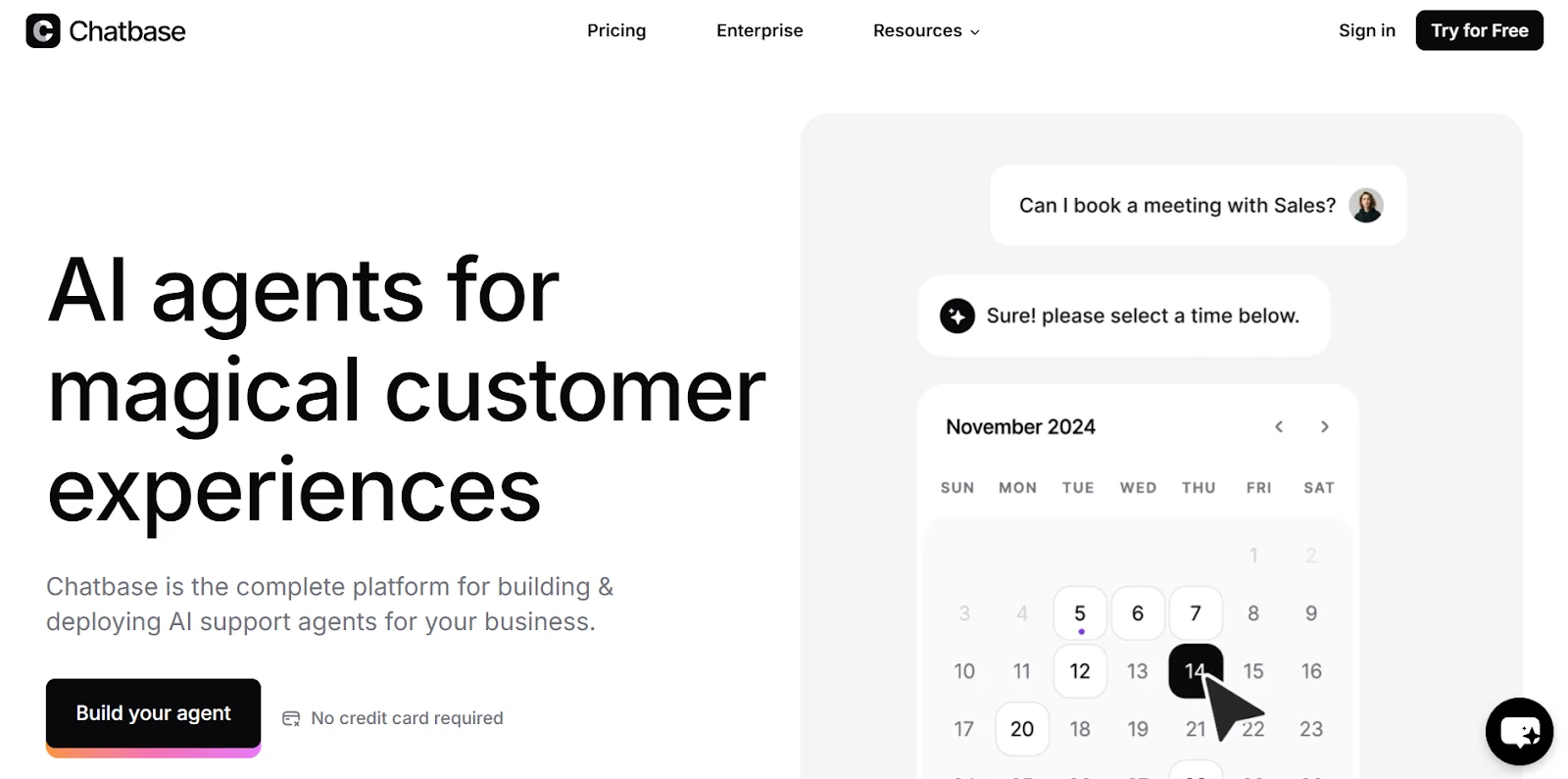
The platform has a free plan with very limited credits, while paid plans scale with the number of messages and bots you need. Unlike SendPulse, ManyChat, or Chatfuel, Chatbase does not focus on multichannel marketing. It lacks built-in features like abandoned cart recovery, Instagram automation, or broadcasting. Instead, its strength lies in embedding AI chatbot on your website that can handle queries instantly, reducing the workload on your support team.
Chatbase supports basic customization, a clean chat widget, and AI-powered responses. However, it does not provide rich UI features like product carousels or catalog cards, and it has limited segmentation or event-trigger options. If your priority is customer service efficiency rather than active marketing, Chatbase can be a valuable addition. But for driving sales and running campaigns, it lacks the ecommerce-specific automation that other tools provide.
For a detailed guide on leveraging WhatsApp for automated customer engagement, check out this in-depth article from Chatbase on WhatsApp Chatbots.
5. Botsonic – Best for Website AI Chat and Lead Capture
Botsonic, created by Writesonic, is another AI-driven chatbot builder. It is especially strong for website chat widgets, lead capture, and conversational support. The platform offers a 7-day free trial and a Starter Plan priced at around $16 per month (or $19 if billed monthly). This entry-level plan includes one chatbot and around 1,000 messages per month, with upgrades available as you scale.
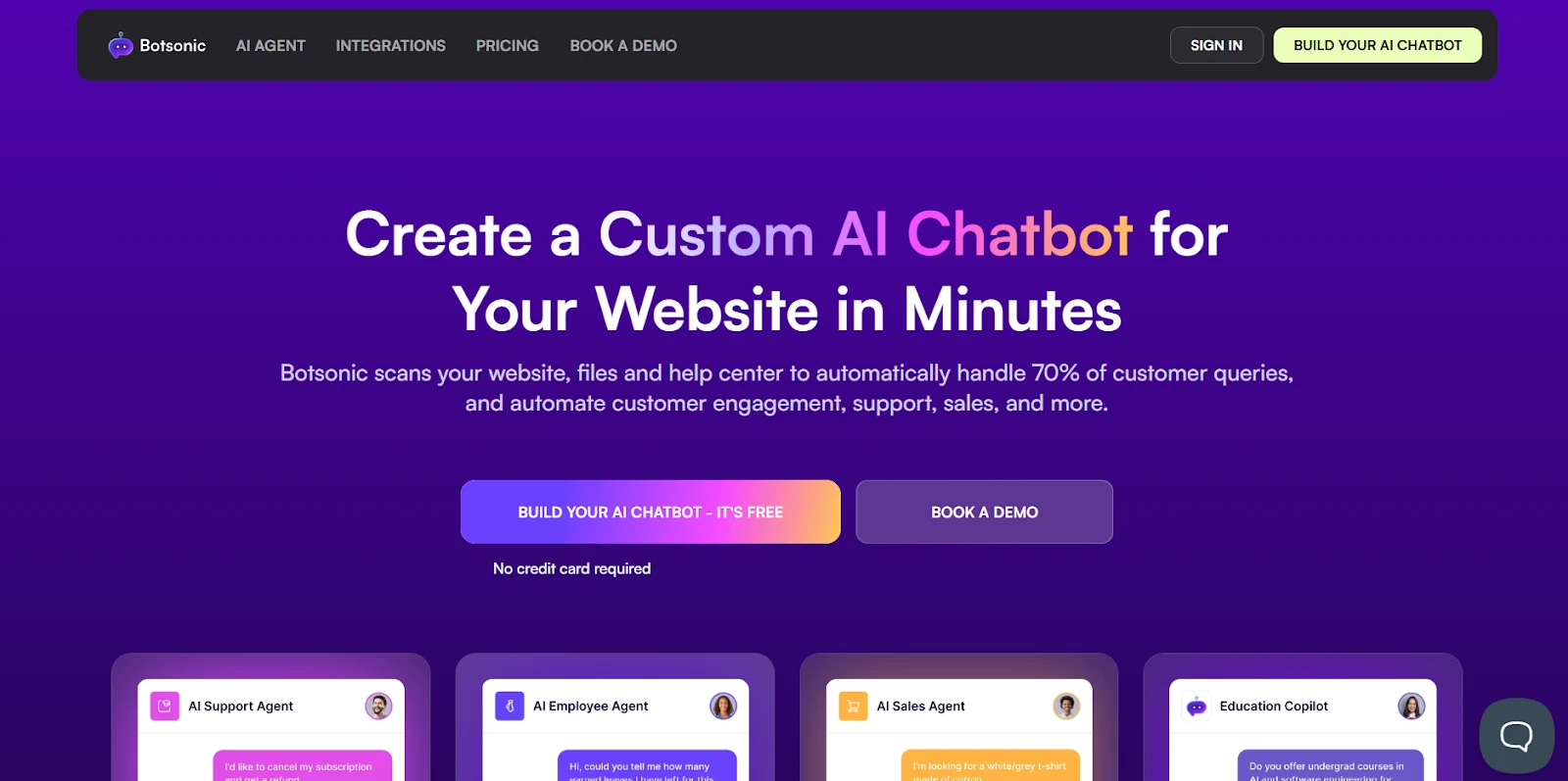
Botsonic is designed primarily for AI website chat, not multichannel social automation. It can be trained on your content and knowledge base, similar to Chatbase, but it adds some ecommerce-friendly tools like event-based triggers and lead capture flows. However, features such as abandoned cart recovery, product catalogs, and social media comment automation are not natively supported. It also doesn’t emphasize WhatsApp or Messenger support the way SendPulse, ManyChat, or Chatfuel do.
For beginners, Botsonic is appealing if your ecommerce store relies on its website as the main touchpoint and you want an AI agent to answer questions, qualify leads, and reduce support load. The visual flow builder is modern and simple, though not as comprehensive for ecommerce funnels as SendPulse or ManyChat. Its main strength lies in blending AI responses with website engagement, making it a good support-first tool rather than a full ecommerce marketing engine.
Final Thoughts – Why SendPulse Wins for Beginners
Chatbots are transforming the way businesses engage with their audiences, but their impact grows even stronger when combined with other marketing strategies. Integrating chatbots with email marketing tools can help you automate follow-ups, segment your audience, and boost conversion rates through targeted campaigns. To maximize your marketing results, check out this comprehensive guide to the best email marketing tools available today.
As for chatbot tools, each of these platforms has its strengths. ManyChat and Chatfuel are excellent if your growth depends heavily on social platforms like Facebook and Instagram, while Chatbase and Botsonic shine if your main concern is customer support through AI-driven chat on your website.
However, SendPulse comes out on top for beginners in ecommerce because it blends the best of both worlds: a generous free plan to test and validate, affordable upgrades when you’re ready to grow, and a comprehensive set of ecommerce-specific features such as abandoned cart recovery, product catalog integration, event triggers, review request flows, segmentation, and multichannel broadcasting. Unlike most competitors, it also unifies social, website, SMS, and email automation in one place.
If you want a chatbot that not only answers questions but also drives sales, recovers lost revenue, and scales with your store, SendPulse is the most beginner-friendly yet future-proof choice.
